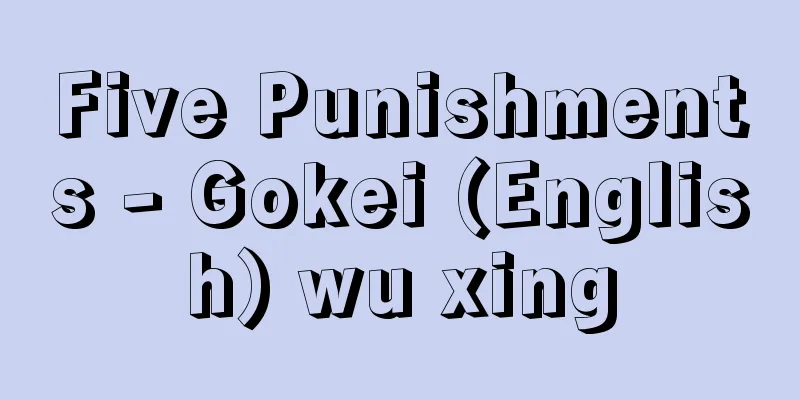Headman - Myoshu

|
Agricultural managers who occupied myoden (fields) that existed from the Heian period through the Middle Ages and were responsible for paying the taxes and public duties imposed on them. At first, they were the patriarchs of patriarchal families, who managed the fields by employing their family members and servants, and were responsible for paying the taxes and public duties. At the end of the Heian period, priests and monks appeared as myoden in temple and shrine lands, and lower-ranking officials in kokuga lands, and many of them took on the character of small feudal lords. These small feudal lords were the basis for the emergence of samurai. After the late Kamakura period, the ownership of myoden became a property right and a right to share the land, called myoden shiki, and one myoden came to be divided among several myoden holders, who were also called myoden holders. Furthermore, during the Muromachi period, manor lords sometimes appointed myoden in addition to the myoden position to collect taxes, and the meaning of the term myoden became extremely complex. As the goson system developed, many headmen played leading roles in rural areas, but after the Taiko land survey, some were incorporated into the vassals of the daimyo, while the majority became village officials under the feudal domain system. → Related topicsIkki|Oban Toneri|Otona|Kaihatsu feudal lord|Kajitori|Kashiwagi no Mikuriya|Kama no Mikuriya|Kuga no Sho|Konoki no Sho|Suzuki no Sho|Chikauke|Landlord|Manors (Japan)|So|Banshu|Name register|Hiranodono Sho|Names and fields Nanushi (headman)→ Related topics Silk Rebellion|Sekisho Tegata|Oku and Koku|Tenma Incident|Fukuchiyama|Mankoku Incident|Miyazu|Yamagata Domain Source : Heibonsha Encyclopedia About MyPedia Information |
|
平安期から中世を通じて存在した名田(みょうでん)を占有し,それに課される年貢・公事(くじ)などの納入責任を負った農業経営者。初めは家父長制家族の家父長で,家族や下人(げにん)を使役して経営し,年貢・公事の貢納責任をもった。平安末期,寺社領では神官や僧,国衙(こくが)領では下級官人が名主として現れ,小領主的性格を帯びるものが多くなった。これらの小領主層を基盤に武士が発生する。鎌倉後期以後,名田の所有権は名主職(しき)という財産権,得分権となり,一つの名田が複数の名主職所有者によって分割されるようになり,この名主職所有者をも名主と呼んだ。さらに室町時代には荘園領主が年貢徴収のため名主職とは別に名主を任命することがあり,名主という語の内容はきわめて複雑化した。郷村(ごうそん)制の発展に伴い,名主の多くは農村で指導的役割を果たしたが,太閤検地を契機として,一部は大名の家臣団に編入,大部分は幕藩体制下の村役人などに転身した。 →関連項目一揆|大番舎人|大人|開発領主|梶取|柏木御厨|蒲御厨|久我荘|近木荘|雀岐荘|地下請|地主|荘園(日本)|惣|名主|名寄帳|平野殿荘|名・名田 名主【なぬし】→関連項目絹一揆|関所手形|大区・小区|伝馬騒動|福知山|万石騒動|宮津|山形藩 出典 株式会社平凡社百科事典マイペディアについて 情報 |
<<: Village Headman's Association - What is the mechanism?
>>: What should be done - What should be done (English spelling) Chto delat'
Recommend
Himetenkomushi - Himetenkomushi
A small freshwater animal of the phylum Tentacula...
Bellerophon (English spelling)
Hero of Greek mythology. Born in Corinth to King G...
España - Espanya
…Official name: Estado españolArea: 504,782 km2Po...
Wat Sutat (English spelling)
…Wat Trimit Temple has a 3m-tall, 5.5t-weight pur...
filled band
… Because electrons are fermions, each energy lev...
Criticism of Hu Shi's Thought
After the founding of the People's Republic of...
Japanese literature
The Japanese people, surrounded by the sea, have ...
Indirect leveling - indirect leveling
...A survey to determine the difference in elevat...
Katamachi Gas and Oil Field - Katamachi Gas and Oil Field
…With the exception of Katamachi, which was a pos...
Battle of Kawagoe Castle
A battle for Kawagoe Castle in Musashi Province to...
Gozanze Myoo
One of the Five Great Wisdom Kings, he is located...
Nakamura Denkuro
Kabuki actor. There are six generations, beginning...
Onigurumi - Onigurumi
A deciduous tree of the Juglandaceae family (APG ...
Yerushalayim - Yerushalayim
…the central city of the Palestinian region. It i...
organdy finishing
…Also, concentrated sulfuric acid or cold caustic...









